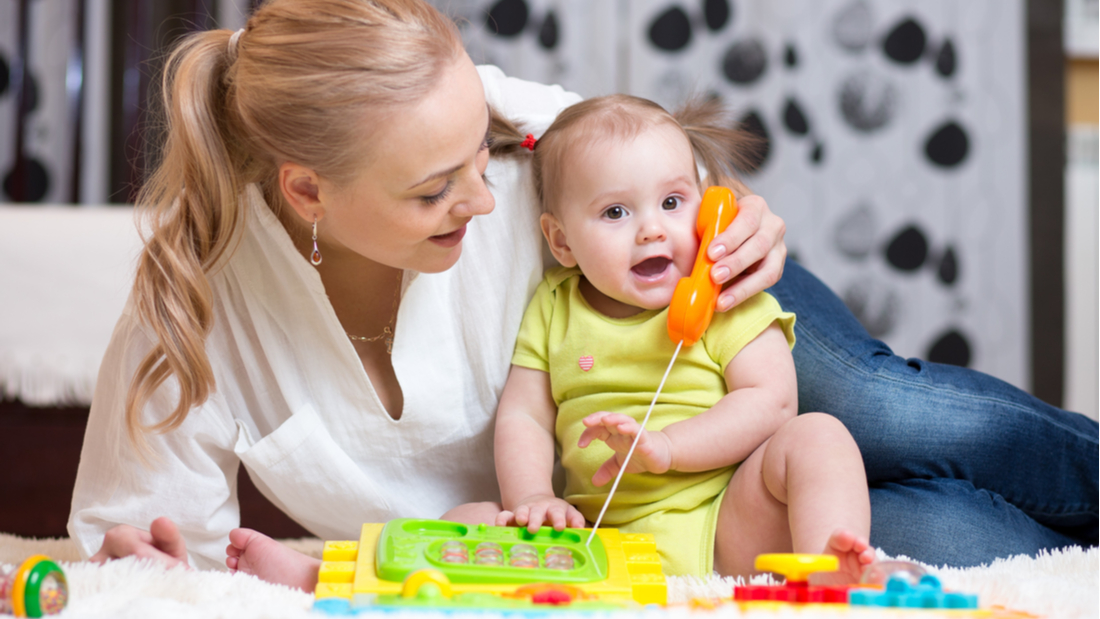Overview of Language Development
In this article:
- Introduction
- 0-3 months
- 6 months
- 9 months
- 12 months
- 18 months
- 2 years
- 2 ½ years
- 3 years
- 4 years
- Main points

Introduction
The first four years of a child’s life involve an intensive period of learning when it comes to their acquisition of language skills. During these years, the brain is extremely plastic, meaning it has an ability to absorb language that far exceeds its potential at any other time in life. There are two parts to language: receptive (understanding) and expressive (communicating). So that full developmental potential is possible, babies must be exposed to the right stimulation.
Your child’s development is broadly assessed as gross motor, fine motor, speech/language and social. Developmental ‘milestones’ are the expected ages of achieving certain developmental skills, but it is important to be aware that every baby will achieve milestones differently. It might be entirely normal for some children to be weeks or months late in achieving certain milestones.
When seeking medical advice about delayed development, paediatricians have different thresholds for investigating, so the initial advice may well be to watch and wait. Speech is closely linked to hearing – without the ability to hear, language cannot be acquired in the normal way. When there are concerns about delayed speech and language, the first thing to do is to make sure there are no problems with hearing.
More information:
- Fine motor skills developmental milestones
- Gross motor skills developmental milestones
- Social developmental milestones
0-3 months
Not a huge amount is expected of your baby at this age in terms of language skills. They should react to sounds and startle to loud noises, and calm down when spoken to by a familiar voice. At this age, your baby is very good at crying, which in itself is a method of communication. They learn that a cry encourages food and comfort. It is sometimes possible to discern different type of cries when your baby is communicating different needs.
6 months
Over the past six months, your baby has been avidly listening to your every word. They are now good at localising sounds, and they will track these with their eyes or with a head turn. Toys that make sounds may now be a favourite. Your baby will have started to recognise basic language, such that they can understand ‘bye’, ‘no’ and ‘yes’, and also respond to changes in the tone of your voice. They have also started babbling, using monosyllabic noises, initially starting with ‘p’, ‘b’ and ‘m’.
9 months
At 9 months, babies can usually recognise their own name. Babbling is also progressing and has matured to repetitive groups of sounds e.g. ‘baba’. They are also able to imitate adult speech sounds and can communicate through actions, such as waving.
12 months
Around 12 months, your baby will show understanding of simple nouns, such as being able to point when asked “where’s mummy/daddy?” Expressive language is also developing, and most children will acquire their first words, with about 50% having three words at 13 months old. These are usually simple words – ‘mama’, ‘dada’, ‘bye’.
18 months
Your child is essentially just developing the skills learned so far. Understanding is still mainly focused on nouns, but these are now more complicated, such as identifying toys or pointing at animals in books on command. They can often also point at their own body parts. This helps when following simple commands, such as ‘get your shoe’ or ‘give me the cup’. Expressive language has now improved to about six words.
2 years
Your child can now understand verbs. When asked, they can identify what they draw, eat and drink with. Spoken language has now rapidly taken off, with around 50 words in their vocabulary. They can string two words together, for example, by prefacing words with “more” or “no”.
2 ½ years
At 2 ½ years old, the understanding of prepositions is matured. This means children start to understand the concept of ‘in’, ‘on’, ‘under’ etc., so they can follow commands such as “put the spoon in the cup”. They are also starting to use two or three-word phrases.
3 years
Understanding has now progressed to adjectives (e.g. colours) and comparatives (e.g. size comparisons). You can help develop this by asking them to bring you items of different colours. If you have a series of blocks or toys of different sizes, you can point to the middle one and ask them to find one that is bigger or smaller.
4 years
By now, your child has a complex knowledge of language. This includes both understanding of complex, several-step instructions and the ability to describe a complex sequence of events to narrate a story. They can answer simple questions and talk about their day’s activities using sentences with multiple words. They enjoy listening to short stories and are able to answer simple questions about the story afterwards.
Main points
- Your baby may achieve developmental milestones at a different age to other infants.
- The first four years of life is a period of intense learning in relation to language skills.
- Babies must be exposed to the right stimulation in order to achieve their full potential.
- There are two parts to language: receptive (understanding) and expressive (communicating).
- A baby’s hearing is key to early language skills.
- In the first three months, your baby should react to sounds and be calmed by familiar voices.
- At around six months, your baby will have started to recognise basic language and will have begun ‘babbling’.
- At around nine months, babies will start to produce repetitive sounds.
- From 12 to 18 months, infants will begin to acquire their first words and will begin to identify toys and body parts by name.
- From 2 to 4 years, children will begin to understand more complex language concepts including adjectives and comparatives. By the age of four they should enjoy listening to stories and be able to follow instructions comprising of several steps.
Important – If you or your child are unwell you should seek medical advice from a professional – contact your GP or visit an A&E department in an emergency. While My BabyManual strives to provide dependable and trusted information on pregnancy and childcare 24/7 via our website pages, we cannot provide individual answers to specific healthcare questions.



